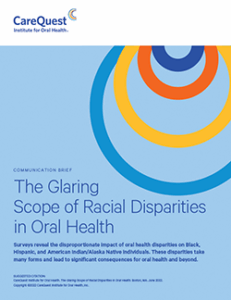CareQuest Institute surveys of both US consumers and health care providers reveal a stark reality that race and ethnicity are closely linked with the health of an individual’s mouth and their livelihood.
A communication brief from CareQuest Institute shines a light on these disparities, summarizing key findings from our 2021 and 2022 State of Oral Health Equity in America surveys and numerous other sources. The authors write, “With these and other data, the oral health community has the opportunity to leverage the heightened awareness of disparities to take action to eliminate them and advance health equity.” Key insights from the research include:
- Nearly 1 in 6 Black adults (16%) reported having lost at least six teeth due to tooth decay or gum disease. This degree of tooth loss is much higher than the proportions among adults who are white (12%), Hispanic (9%), or Asian (3%).
- Black (17%) and Hispanic (16%) adults were more likely than white adults (14%) to say they had felt “self-conscious or embarrassed because of [their] teeth, mouth, or dentures” either very often or fairly often over the past year.
- Black (9%), Asian (5%), and Hispanic (4%) adults were more likely than white adults (2%) to believe they “did not get a job” because of their teeth, mouth, or dentures.
- Black adults were at least 2.5 times more likely than white, Hispanic, or Asian adults to have visited a hospital emergency department for dental care.
The brief also examines the economic and educational implications of these disparities, challenges for providers of color, and the importance of expanding oral health coverage through Medicaid and Medicare. The authors urge oral health professionals to “learn about and acknowledge the history of racism in the US while confronting misconceptions they might have about race.”
You may also be interested in:
- Webinar: Taking Action to Advance Anti-Racism in Dental Public Health, a recorded webinar featuring a distinguished panel of experts discussing what the dental community can do to find anti-racist solutions for its industry.
- Americans Are Still Not Getting the Dental Care They Need, the first in a series of reports summarizing key findings from our nationally representative survey in 2022 of nearly 6,000 adults about their oral health.
- Taking Action on Racism: An Inside Look at a Special Issue, an interview with Julie Reynolds, DDS, MS, and Eleanor Fleming, PhD, DDS, MPH, FICD, guest editors of a special Journal of Public Health Dentistry, examining anti-racist solutions in dental public health.

